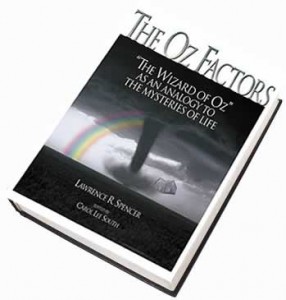Republished by Blog Post Promoter
YOU, SEEING YOUR SELF….
miscellaneous postings by Lawrence R. Spencer
Republished by Blog Post Promoter
THE MEAT MYTH
“Better get under cover, Sylvester! There’s a storm blowin!–a whopper–to speak in the vernacular of the peasantry!”–Professor Marvel, in ‘The Wizard of Oz’
Like a twister swirling across the plains of America, the consumption of animal protein is killing Americans who do not know enough to protect themselves from the storm of false information furnished by the vested interests who profit from the sale of animal flesh as food.
Clearing up confusions about the human body’s need for protein sheds a different light on health and diet.
The word “protein” is derived from the Greek language and means “of primary importance”. Amino Acids, the component parts of protein, are the biochemical basis for life and are required by every cell. The immune system’s antibodies are protein. Endrocine hormones are protein. The cement that holds our cells together is made of protein.
HOW MUCH PROTEIN IS “ENOUGH”
Human mother’s milk contains no more than 5% protein. This is enough protein to enable an infant to double its weight and size during the first six months of life! After that, the need for protein DECREASES.
Independent researchers around the world agree that the human need for protein each day is only 25 to 35 GRAMS (about one ounce). Many nutritionists feel that only 20 grams a day are more than enough. Meanwhile, the AVERAGE AMERICAN eats more than 100 GRAMS of protein a day–five times the actual need!
Reports in the American Journal of Clinical Nutrition say that people do not need to consume more than 2.5% of their daily caloric intake from protein. Even the World Health Organization says people need no more than 4.5% of their calories from protein.
So, as an alternative to animals flesh, how many calories are provided from protein in common raw fruits and vegetables?
SPINACH = 49%
BROCCOLI = 45%
CAULIFLOWER = 40%
LETTUCE = 34%
PEAS = 30%
GREEN BEANS = 26%
CUCUMBERS = 24%
CELERY = 21%
POTATOES = 11%
SWEET POTATOES = 6%
HONEYDEW MELON = 10%
CANTALOUPE = 9%
STRAWBERRIES = 8%
ORANGES = 8%
WATERMELON = 8%
PEACHES = 6%
BANANAS = 5%
PEARS = 5%
 WHERE’S THE PROTEIN IN THE BEEF?
WHERE’S THE PROTEIN IN THE BEEF?
Since our bodies recycle 70% of the protein waste, we lose only about 23 grams of protein a day (there are 28.35 grams in one ounce). To replenish this lost protein, your body needs only about 24 ounces (1.5 pounds) of protein a month. So, why do we think we must eat huge amounts of meat to be healthy? Advertising. The meat and dairy industries spend vast sums of money in television and magazine advertising every year to convince Americans that we must eat huge amounts of cow meat, cheese, milk, eggs, chicken and other assorted animal products.
What’s the truth about meat as a source of protein? The Food and Nutrition Board of the National Research Council states: “One of the biggest fallacies ever perpetuated is that there is any need for so-called ‘complete protein’.”
The fact is that protein is composed of amino acids. Amino acids are the building blocks of the human body. There are a total of 23 amino acids needed by the body, of which 15 of these our bodies manufacture in the liver–provided the liver is in good working order. The other eight amino acids must come from food so the body can build a complete protein.”
— Excerpt from THE OZ FACTORS, by Lawrence R. Spencer
Republished by Blog Post Promoter
A clever song and comical animation about Freedom, Firearms and the rights of Farm Animals!
Republished by Blog Post Promoter
François-Marie Arouet, known by his nom de plume Voltaire, was a French Enlightenment writer, historian and philosopher famous for his wit and for his advocacy of civil liberties, including freedom of religion, freedom of expression, free trade and separation of church and state. Voltaire was a versatile writer, producing works in almost every literary form, including plays, poems, novels, essays, and historical and scientific works. He wrote more than 20,000 letters and more than 2,000 books and pamphlets. He was an outspoken supporter of social reform, despite strict censorship laws with harsh penalties for those who broke them. As a satirical polemicist, he frequently made use of his works to criticize intolerance, religious dogma, and the French institutions of his day. Voltaire was one of several Enlightenment figures (along with Montesquieu, John Locke, Richard Price, Jean-Jacques Rousseau, and Émilie du Châtelet) whose works and ideas influenced important thinkers of both the American and French Revolutions. — http://en.wikipedia.org/wiki/Voltaire